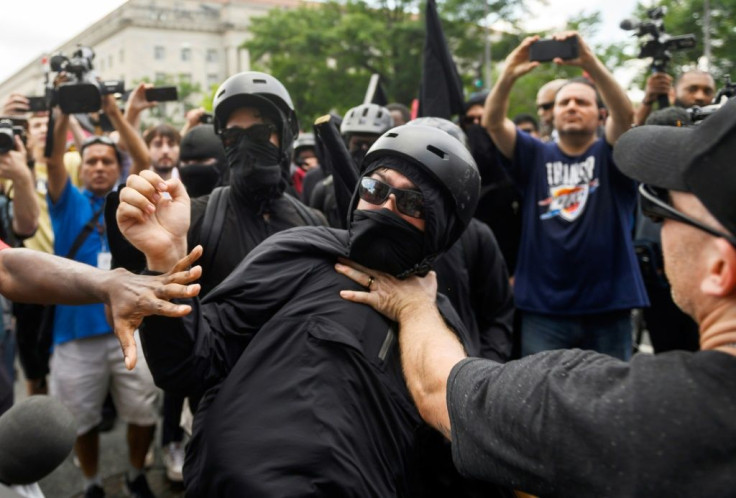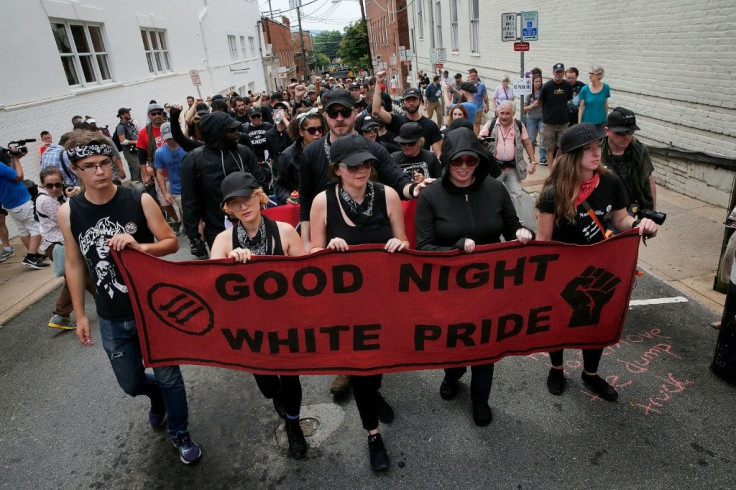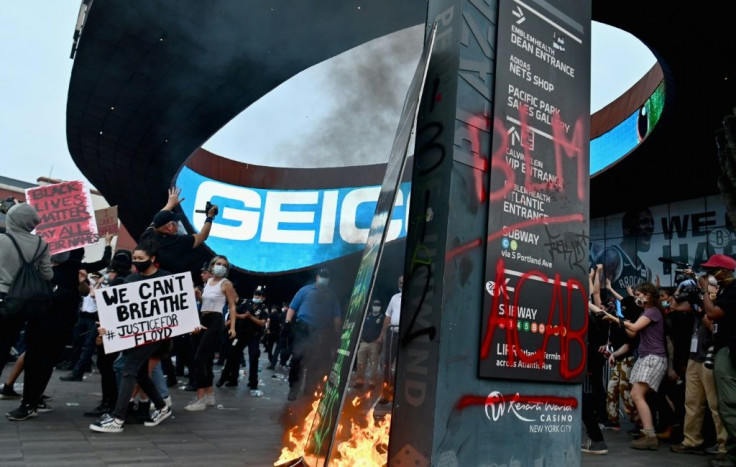Antifa: 'Terror' Group Or Trump's Straw Man?

US President Donald Trump has blamed the protest violence in the United States on Antifa, saying the leftist activist network will be formally designated "terrorists" on the same level as al-Qaeda and Islamic State.
Both White House National Security Advisor Robert O'Brien and Attorney General Bill Barr also singled out Antifa "radical militants" for stoking the rioting.
"The United States of America will be designating ANTIFA as a Terrorist Organization," Trump tweeted.
Antifa stands for anti-fascism, and the name comes from early 1930s Germany, where socialist "anti-fa" groups attempted to stand up to the rise of Adolf Hitler's Nazis.
Over the past two decades anti-fascist groups in the United States have campaigned on a range of social justice issues.
"We believe in & fight for a world free of fascism, racism, sexism, homo/transphobia, antisemitism, Islamophobia & bigotry," said a Twitter post this week from New York Antifa.
But their principle focus has been countering the resurgence of neo-nazi and white supremacist groups. One of the oldest, Rose City Antifa of Portland, Oregon, began in 2007 to shut down a neo-Nazi skinhead music festival called Hammerfest.
Their tactics mostly involve publicly outing right-wing extremists and organizing counter-protests. But since Trump's election in 2016 encouraged right-wing groups, Antifa has engaged in direct confrontations with them and destructive civil disobedience.
During Trump's inauguration on January 20, 2017 scores of black-clad, mask-wearing Antifa and other protestors smashed windows and burned a car in Washington.

In August that year, they were at the vanguard of counter-demonstrations when white supremacists and neo-nazis marched in Charlottesville, Virginia, and engaged in physical fights with the rightists.
Since then the two sides have taunted and brawled with each other in several places including Portland and Berkeley, California.
But Antifa has no head or national organization, according to a Congressional Research Service analysis.
It described Antifa as "decentralized, consisting of independent, radical, like-minded groups and individuals."
Mostly they are non-violent, the report says, but "a portion of antifa movement members are willing to commit crimes to promote their beliefs."

Aside from Trump and his top allies, US officials and state and local officials say the violence and destruction in cities across the country involves multiple groups, on the right and left, including but not limited to Antifa.
"Various domestic terror groups on BOTH far left & right are instigating & committing acts of violence & looting," Senator Marco Rubio, who as chair of the Senate Intelligence Committee receives top level intelligence briefings, said Sunday.
ABC News reported that Department of Homeland Security intelligence reports blame actors on both ends of the political spectrum.
Officials in Minnesota say their information points to instigators including white nationalists, leftist anarchists, and even drug gangs.
Mark Bray, a Dartmouth University historian who wrote "Antifa: The Anti-Fascist Handbook," said Monday that there are certainly Antifa activists involved, though their loose organization and small cells make it impossible to ascertain how many.
"Basically, there are nowhere near enough anarchists and members of antifa groups to have accomplished such breathtaking destruction on their own," Bray wrote in the Washington Post.
Not likely. The US has no statute that permits designating violent domestic groups terrorists, as they have for international groups like Islamic State or Al-Qaeda.
The global terror designation is a powerful tool for law enforcement: it permits the arrest and imprisonment of someone who merely expresses support for those jihadist groups or others.
That law has not been expanded to domestic groups for good reason: such a law, many fear, could tempt a leader to deploy it against political rivals.
Nevertheless, there is pressure for some sort of elevated designation, especially since several mass shootings of African Americans and Jews by white nationalists in the past several years.
In February, FBI Director Chris Wray told Congress that White nationalist groups would be investigated in the way Islamic State sympathizers are, using the FBI's Joint Terrorism Task Force.
While Attorney General Barr also singled out Antifa as instigating the riots, he was likewise limited in putting an investigation in the hands of the same task force.
He indicated the legal focus would be on federal crimes involving crossing state lines to participate in the rioting.
It is possible that the government might try to use international links of a group like Antifa to apply the terror designation.
In April, Washington took that step for the first time, designating a Russia-based white supremacist group, the Russian Imperial Movement, as terrorists.
© Copyright AFP {{Year}}. All rights reserved.




















